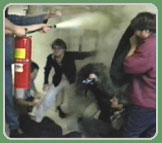 |
|
| Chapter 1: |
University of Wisconsin - Part 1 |
 |
|
| Chapter 2: |
University of Wisconsin - Part 2 |
 |
|
| Chapter 3: |
University of Wisconsin - Part 3 |
 |
|
| Chapter 4: |
University of Michigan |
 |
|
| In order to view the video or the stills you need to have RealPlayer installed. |
|
|
by Stew Harris, Public WebWorks Staff
With two campus sit-ins on her anti-sweatshop resume, University
of Wisconsin student Molly McGrath already bears the battle scars of a wizened activist.
The 24-year old will have to finish her degree on academic probation.
It is punishment for McGrath's role in the takeover of Baskim Hall in February,
2000, perhaps the largest and certainly the most animated direct action in the
Students Against Sweatshop movement.
Protests on numerous campuses over the last two years have
forced schools nationwide to reconsider where they purchase clothing emblazoned
with university logos and sold on campus. This is big business; colleges rake in
about $2.5 billion annually.
The demonstrations last winter, including the Wisconsin
action organized by McGrath, forced many schools to enter a sweatshop
monitoring group conceived by students called the
Workers Rights Consortium.
But there was a price: police arrested McGrath and 53 other
students who had hunkered down at Baskim Hall in Madison, Wisconsin Feb.
16-20, 2000. At one point, school security guards showered pepper spray on
the students, who shot back with a borrowed fire extinguisher. Watch the video.
"I think a big part of why they (arrested us) was to
deplete our resources," says McGrath, a women's studies major. "Most of us
spent the rest of the spring semester dealing with legal repercussions."
Those repercussions included a $150 court fine and academic
probation. But McGrath says the appetite for activism on campus has not
been dampened; a new class of students - and potential activists - arrives
every fall. "That's the great thing about student activism:
turnover is very high," she says.
There may have been another casualty of the protest.
One week later, university Chancellor David Ward announced he would
resign. He denies his announcement had any connection to the protest.
The University of Wisconsin has made a number of policy moves to
hold clothing manufacturers accountable for their workshop conditions.
For example, school spokesman Eric Christiansen points to the school's
implementation of its own standards for verifying working conditions.
Ties to contractors which failed to comply with those standards have
been severed, he said.
February, 2000 also saw the University of Michigan join
the Workers Rights Consortium
after students there occupied
a dean's office for a three-day "sweat-in." Watch the video. The
invading students used irons and transfers to apply anti-sweatshop
logos to tee shirts, which they hung out a dean's office windows,
taunting school administrators to the cheers of fellow protestors
on the grounds below.
Winter sit-ins were also waged at administration buildings at
Duke and Georgetown universities.
Actions continue. In November 2000, students at the University
of Arizona blocked an administration building for an afternoon.
Recently, the campaign has also spread off campus.
One target is Kohl's, a midwest department store, which students say
imports sweatshop-made goods from two factories in Nicaragua. In October
2000, students struck twice.
First it was Ann Arbor, where police arrested ten protestors including
two Nicaraguan workers blocking the entrance to a Kohl's store.
Three weeks later, Harvard Yard was covered with leaflets denouncing
the ivy league school's investment in Kohl's, which does business with
Nicaraguan factories where managers
"abuse and yell at the workers, calling them 'stupid, useless work
animals,'" the leaflet says.
In its own defense, a company statement says: "Kohl's
will only do business with vendors whose workers are treated fairly,
are on the job voluntarily, are not put at risk of physical harm, are
fairly compensated and allowed the right of free association and not
exploited in any way. Read the Company's Statement
"Kohl's is a great campaign for students in the
international community because there have been such gross
violations in Nicaragua in the free trade zones," says Peter
Romer-Friedman, an economics student at the University of Michigan
and a leader in the anti-sweatshop movement. "Students have been
fired up enough to protest directly at the stores. While no agreement
has been reached yet, it is very promising."
Sound optimistic? Students like Romer-Friedman have a
right to be. He was involve in February 2000 when the University of
Michigan join the Workers Rights Consortium after students occupied
a dean's office for a three-day "sweat in." The
invading students used irons and anti-sweatshop logos to manufacture
tee shirts which they hung out the dean's office windows, taunting
school administrators and fellow protestors on the grounds below.
By the end of the school year, 67 universities had
joined the WRC, an impressive number considering the group competes
with a second monitoring organization backed by the White House.
The Fair Labor Association
is denounced by many students because its board includes representatives
from six clothing manufacturers, who together can effectively block any
plans to change the group's charter.
Indeed, after joining the WRC, the University of Michigan
in summer 2000 also joined the FLA, a move that prompted students to
briefly storm an administration building.
"There is no question the administration joined
(the FLA) in the summer to avoid student voices from being heard,"
says Romer Friedman, who is also a WRC board member. "The FLA is a sham.
Speaking as a student: the FLA does not have full public disclosure,
living wage, or true independent monitoring. The FLA entire monitoring system
is corporate-dominated and biased toward apparel corporations that have a
monopoly on the governance and board of the FLA," he says.
The issue of "verification" of working standards is the defining issue
between the FLA and WRC. For example, a press
release on the Fair Labor Association website
lauded plans to deploy "fair labor" labels on clothing made by
companies which agree to follow standards.
However, the companies do not actually have to implement the
standards, only agree to them, to earn the Fair Labor Association's
label. Executive Director Sam Brown is quoted in the release as saying:
"The label won't go as far as guaranteeing no hardship in production of
goods abroad. 'Fair labor' will mean that a company has agreed to meet
standards and is trying to comply."
|



